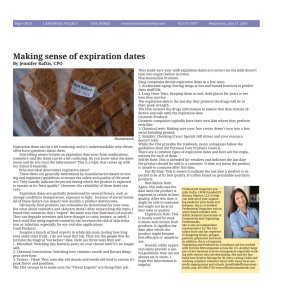| | Published July 17th, 2024
| Making sense of expiration dates
| | | By Jennifer Raftis, CPO |  | | Professional Organizer, Jennifer Raftis, CPOr founded Efficiency Matters, LLC to help you with all of your organizing needs for your home and business. She is a Certified Professional Organizer and an active board member with NAPO, National Association of Productivity and Organizing Professionals. She is also an independent representative for The Container Store and has expertise in designing closets, garages, pantries, playrooms and more. In addition, she is a Corporate Organizing and Productivity Consultant and has worked with Fortune 500 companies across the U.S. Another large part of her business is move management especially working with seniors who are downsizing. She and her husband have lived in Moraga for 30 years, raising 3 kids and working countless volunteer hours with many local non-profit organizations and schools. Jennifer@efficiencymattersllc.com, 925-698-3756 www.efficiencymattersllc.com |
Expiration dates can be a bit confusing, and it's understandable why clients often have questions about them.
 Everything seems to have an expiration date now-food, medications, cosmetics-and the dates can be a bit confusing. Do you know what the dates mean and do you trust the information? This is a topic that comes up with my clients frequently.
Everything seems to have an expiration date now-food, medications, cosmetics-and the dates can be a bit confusing. Do you know what the dates mean and do you trust the information? This is a topic that comes up with my clients frequently.
 Who and what determines expiration dates?
Who and what determines expiration dates?
 These dates are generally determined by manufacturers based on testing and regulatory guidelines to ensure the safety and quality of the product. They usually indicate the period during which the product is expected to remain at its "best quality". However, the reliability of these dates can vary.
These dates are generally determined by manufacturers based on testing and regulatory guidelines to ensure the safety and quality of the product. They usually indicate the period during which the product is expected to remain at its "best quality". However, the reliability of these dates can vary.
 Expiration dates are partially determined by several factors, such as storage conditions (temperature, exposure to light, location of stored items). All of these factors can impact how quickly a product deteriorates.
Expiration dates are partially determined by several factors, such as storage conditions (temperature, exposure to light, location of stored items). All of these factors can impact how quickly a product deteriorates.
 Obviously, food products can sometimes be determined by your nose, but what about cosmetics and skincare items? After researching this topic, I found that cosmetics don't "expire" the same way that food does (of course). They can degrade overtime and have changes in color, texture, or smell. I have read that using expired cosmetics can increase the risk of skin irritation or infection, especially for eye and skin applications.
Obviously, food products can sometimes be determined by your nose, but what about cosmetics and skincare items? After researching this topic, I found that cosmetics don't "expire" the same way that food does (of course). They can degrade overtime and have changes in color, texture, or smell. I have read that using expired cosmetics can increase the risk of skin irritation or infection, especially for eye and skin applications.
 Food Products
Food Products
 Imagine a bunch of food experts in white lab coats, testing how long tuna salad stays fresh.I do not want that job. They are the people that determine the magical "eat before" date. Here are three ways they test:
Imagine a bunch of food experts in white lab coats, testing how long tuna salad stays fresh.I do not want that job. They are the people that determine the magical "eat before" date. Here are three ways they test:
 1. Microbial: Watching tiny bacteria party on your cheese until it's no longer safe.
1. Microbial: Watching tiny bacteria party on your cheese until it's no longer safe.
 2. Chemical Concoctions: Watching how vitamins vanish and flavors disappear over time.
2. Chemical Concoctions: Watching how vitamins vanish and flavors disappear over time.
 3. Tasters - Yikes! They taste day-old donuts and weeks-old food to ensure it's peak flavor and goodness.
3. Tasters - Yikes! They taste day-old donuts and weeks-old food to ensure it's peak flavor and goodness.
 The FDA swoops in to make sure the "Flavor Experts" are doing their job. They make sure your milk expiration dates are correct (so the milk doesn't turn into yogurt before its time).
The FDA swoops in to make sure the "Flavor Experts" are doing their job. They make sure your milk expiration dates are correct (so the milk doesn't turn into yogurt before its time).
 Pharmaceutical Products
Pharmaceutical Products
 Drug companies decide expiration dates in a few ways.
Drug companies decide expiration dates in a few ways.
 1. Accelerated Aging: Storing drugs at hot and humid locations to predict their shelf life.
1. Accelerated Aging: Storing drugs at hot and humid locations to predict their shelf life.
 2. Long Term Tests: Keeping them in cool, dark places for years to see how they survive
2. Long Term Tests: Keeping them in cool, dark places for years to see how they survive
 The expiration date is the last day they promise the drugs will be at their peak strength.
The expiration date is the last day they promise the drugs will be at their peak strength.
 The FDA reviews the drugs information to ensure that they remain effective and safe until the expiration date.
The FDA reviews the drugs information to ensure that they remain effective and safe until the expiration date.
 Cosmetic Products
Cosmetic Products
 Cosmetic companies typically have their own labs where they perform tests like:
Cosmetic companies typically have their own labs where they perform tests like:
 1. Chemical tests: Making sure your face cream doesn't turn into a bacterial breeding ground.
1. Chemical tests: Making sure your face cream doesn't turn into a bacterial breeding ground.
 2. Stability: Checking if your lipstick still shines and your mascara doesn't melt.
2. Stability: Checking if your lipstick still shines and your mascara doesn't melt.
 While the FDA provides the rulebook, many companies follow the guidelines from the Personal Care Products Council.
While the FDA provides the rulebook, many companies follow the guidelines from the Personal Care Products Council.
 There are 4 common types of expiration dates and here are the explanations for each of them.
There are 4 common types of expiration dates and here are the explanations for each of them.
 Sell-By Date: This is intended for retailers and indicates the last date the product should be sold to a customer. It does not mean the product is unsafe to consume after this date.
Sell-By Date: This is intended for retailers and indicates the last date the product should be sold to a customer. It does not mean the product is unsafe to consume after this date.
 Use-By Date: This is meant to indicate the last date a product is expected to be at its best quality. It's often found on perishable and dairy products.
Use-By Date: This is meant to indicate the last date a product is expected to be at its best quality. It's often found on perishable and dairy products.
 Best-Before Date: Again, this indicates the date until the product is expected to retain its best quality. After this date, it might be safe to consume but might not be at its best taste or quality.
Best-Before Date: Again, this indicates the date until the product is expected to retain its best quality. After this date, it might be safe to consume but might not be at its best taste or quality.
 Expiration Date: This is mostly used for medications and certain food products. It signifies the date after which the product might become less effective or unsafe to use.
Expiration Date: This is mostly used for medications and certain food products. It signifies the date after which the product might become less effective or unsafe to use.
 Overall, while expiration dates provide a useful guideline, they are not always set in stone. I hope this information is helpful!
Overall, while expiration dates provide a useful guideline, they are not always set in stone. I hope this information is helpful! |
| | | | | | | | | | | | |


